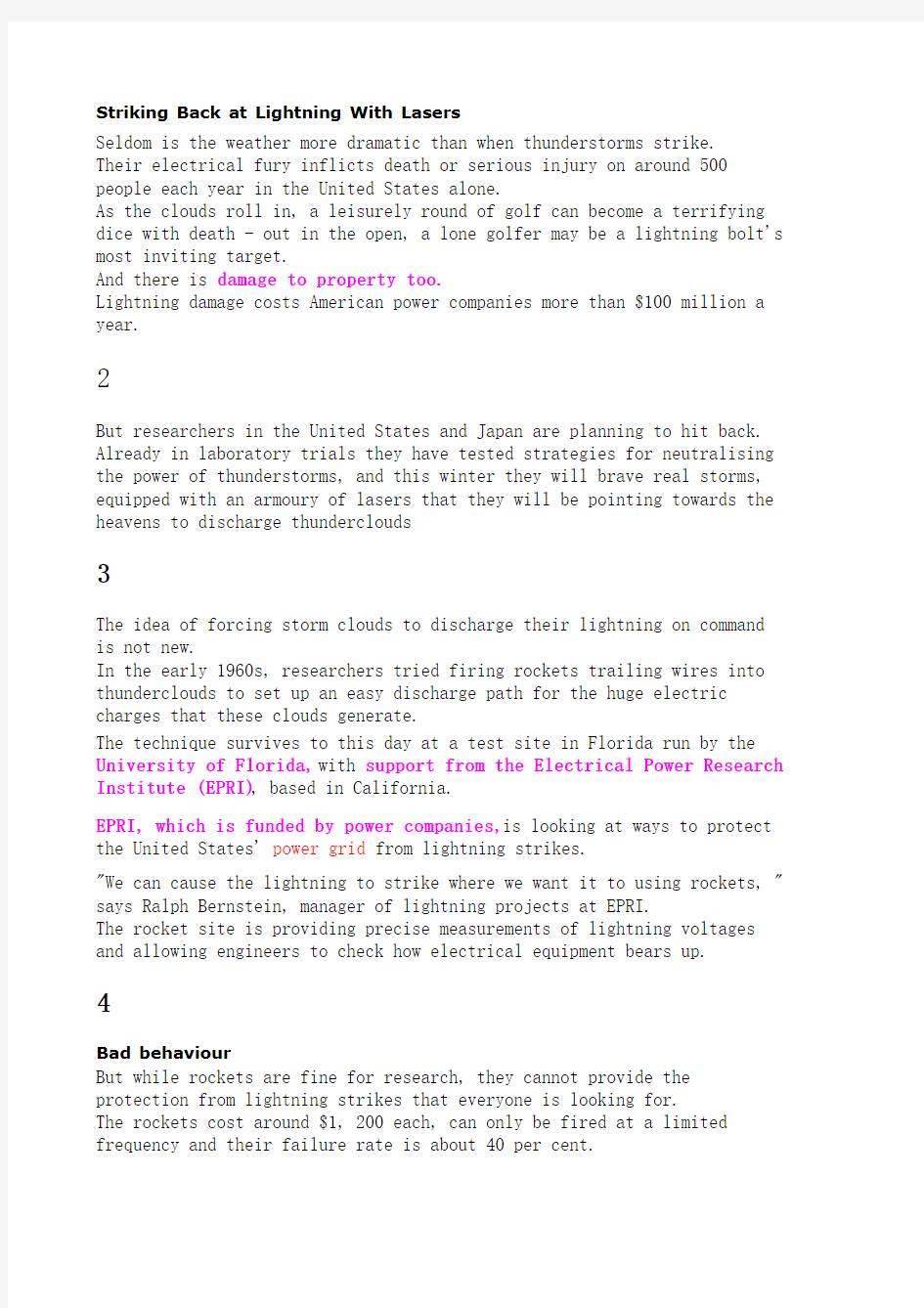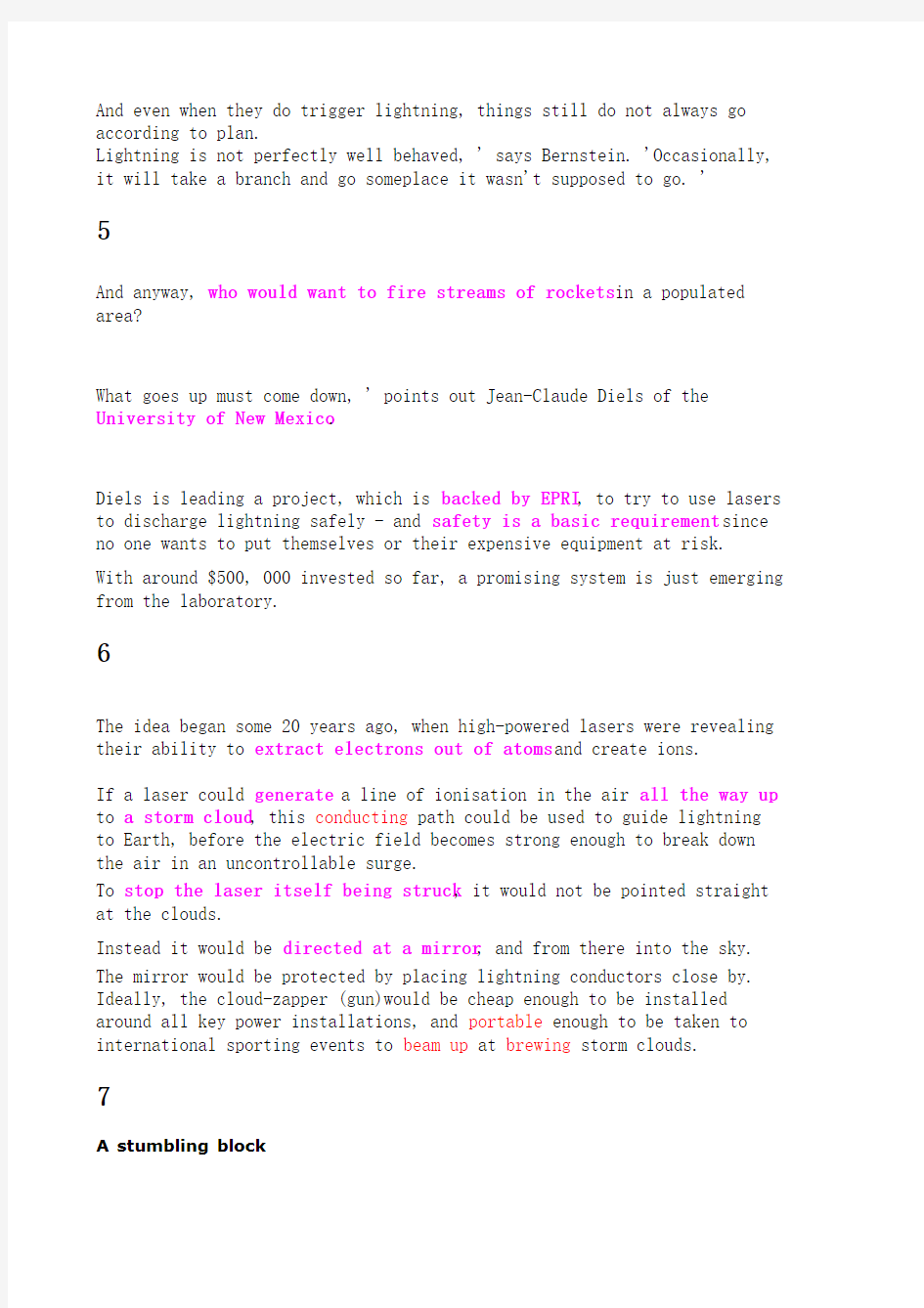Striking Back at Lightning With Lasers


Striking Back at Lightning With Lasers
Seldom is the weather more dramatic than when thunderstorms strike.
Their electrical fury inflicts death or serious injury on around 500 people each year in the United States alone.
As the clouds roll in, a leisurely round of golf can become a terrifying dice with death - out in the open, a lone golfer may be a lightning bolt's most inviting target.
And there is damage to property too.
Lightning damage costs American power companies more than $100 million a year.
2
But researchers in the United States and Japan are planning to hit back. Already in laboratory trials they have tested strategies for neutralising the power of thunderstorms, and this winter they will brave real storms, equipped with an armoury of lasers that they will be pointing towards the heavens to discharge thunderclouds
3
The idea of forcing storm clouds to discharge their lightning on command is not new.
In the early 1960s, researchers tried firing rockets trailing wires into thunderclouds to set up an easy discharge path for the huge electric charges that these clouds generate.
The technique survives to this day at a test site in Florida run by the University of Florida, with support from the Electrical Power Research Institute (EPRI), based in California.
EPRI, which is funded by power companies, is looking at ways to protect the United States' power grid from lightning strikes.
"We can cause the lightning to strike where we want it to using rockets, " says Ralph Bernstein, manager of lightning projects at EPRI.
The rocket site is providing precise measurements of lightning voltages and allowing engineers to check how electrical equipment bears up.
4
Bad behaviour
But while rockets are fine for research, they cannot provide the
protection from lightning strikes that everyone is looking for.
The rockets cost around $1, 200 each, can only be fired at a limited frequency and their failure rate is about 40 per cent.
And even when they do trigger lightning, things still do not always go according to plan.
Lightning is not perfectly well behaved, ' says Bernstein. 'Occasionally, it will take a branch and go someplace it wasn't supposed to go. '
5
And anyway, who would want to fire streams of rockets in a populated area?
What goes up must come down, ' points out Jean-Claude Diels of the University of New Mexico.
Diels is leading a project, which is backed by EPRI, to try to use lasers to discharge lightning safely - and safety is a basic requirement since no one wants to put themselves or their expensive equipment at risk.
With around $500, 000 invested so far, a promising system is just emerging from the laboratory.
6
The idea began some 20 years ago, when high-powered lasers were revealing their ability to extract electrons out of atoms and create ions.
If a laser could generate a line of ionisation in the air all the way up to a storm cloud, this conducting path could be used to guide lightning
to Earth, before the electric field becomes strong enough to break down the air in an uncontrollable surge.
To stop the laser itself being struck, it would not be pointed straight at the clouds.
Instead it would be directed at a mirror, and from there into the sky. The mirror would be protected by placing lightning conductors close by. Ideally, the cloud-zapper (gun)would be cheap enough to be installed around all key power installations, and portable enough to be taken to international sporting events to beam up at brewing storm clouds.
7
A stumbling block
However, there is still a big stumbling block.
The laser is no nifty portable: it's a monster that takes up a whole room.
Diels is trying to cut down the size and says that a laser around the
size of a small table is in the offing.
He plans to test this more manageable system on live thunderclouds next summer.
8
Bernstein says that Diels's system is attracting lots of interest from the power companies.
But they have not yet come up with the $5 million that EPRI says will be needed to develop a commercial system, by making the lasers yet smaller and cheaper.
I cannot say I have money yet, but I'm working on it, ' says Bernstein. He reckons that the forthcoming field tests will be the turning point -and he's hoping for good news.
Bernstein predicts 'an avalanche of interest and support' if all goes well.
He expects to see cloud-zappers eventually costing 100, 000 each.
9
Other scientists could also benefit.
With a lightning 'switch' at their fingertips, materials scientists could find out what happens when mighty currents meet matter.
Diels also hopes to see the birth of 'interactive meteorology' - not just forecasting the weather but controlling it.
If we could discharge clouds, we might affect the weather, ' he says.
10
And perhaps, says Diels, we'll be able to confront some other meteorological menaces.
We think we could prevent hail by inducing lightning, ' he says. Thunder, the shock wave that comes from a lightning flash, is thought to be the trigger for the torrential rain that is typical of storms.
A laser thunder factory could shake the moisture out of clouds, perhaps preventing the formation of the giant hailstones that threaten crops.
With luck, as the storm clouds gather this winter, laser-toting researchers could, for the first time, strike back.
很少有比雷暴天气更令人感到恐怖的天气了。
仅在美国,猛烈的雷暴电流每年都会造成大约500人死亡或重伤。
云层翻滚而来的时候,在户外打一场轻松的高尔夫成了一件异常可怕的事情,无异于是在拿自己的性命开玩笑——孤身一人在户外的高尔夫球手可能是闪电最喜欢攻击的目标。
此外,闪电也会带来财产损失。
每年闪电会对美国电力公司造成超过一亿美元的损失。
不过,美国和日本的研究人员正在策划回击闪电的方案。
军械库;兵工厂 =armory.
他们已开始通过实验测试中和雷暴电荷的各种方法。今年冬天,他们将直面雷暴:使用配备的激光器射向空中的雨云,使其在闪电出现之前放电。
迫使雨云根据指令释放闪电并非一个新想法。
早在20世纪60年代早期,研究者们就尝试过把带着拖曳线的火箭射入雨云,以期为这些云层发出的庞大的电荷群搭建起便捷的放电路径。
由于受到建在加利福尼亚的电力研究所(EPRI)的支持,这一技术在佛罗里达的州立大学试验基地幸存到了今天。
EPRI由电力公司资助,现正致力于研究保护美国输电网不受闪电袭击的方法。
“我们可以通过火箭让闪电击向我们想让它去的地方,”EPRI的闪电项目经理Ralph Bemstein如此说道。
该火箭基地现在能对闪电电压进行精确测量,并可以让工程师们检测电气设备的负载。
虽然火箭在研究中功不可没,但它们无法提供闪电来袭时所有人都希求的保护。
每支火箭造价大约1,200美元,发射频率有限,而失败率却高达40%。
即使它们确实能够引发闪电,事情也无法总是按计划顺利进行。“闪电可不那么听话,”Bernstein说,“它们偶尔会走岔路,射到它们本不该去的地方。”
但不管怎样,有谁会想在人口密集的地区发射成群的火箭呢?“射上去的肯定会掉下来,”新墨西哥大学的Jean-Claude Diels指出。
Diels现在正在负责一个项目,该项目由ERPI所支持,试图通过发射激光使闪电安全放电——安全是一项基本要求,因为没人愿意把他们自己的性命或他们的昂贵设备置于危险之中。
有了迄今为止的50万美元的投入,一套有巨大潜力的系统装置正在该实验室慢慢成形。
这一系统装置的想法始于大约20年前,当时正在开发大功率激光器从原子中提取电荷并生成离子的能力。
如果激光器能够生成一条直达暴雨云的离子线,就可以在闪电电场增强为一股无法控制的涌流并击破空气之前,用这条传导通道把电荷引导到地面上来。
为了防止激光器本身受到电击,不能把它直接对准云层,
而是要把它对准一面镜子,让激光通过镜子折射向天空。
要在靠近镜子的四局布置闪电传导器从而对其进行保护。
理想的做法是,云层遥控器(枪)要比较廉价,以便能够把它们安装在所有重点电力设备周围;另外还要方便携带,以便在国际运动赛事场地中用于使逐渐聚积的雨云失去威力。发光 策划
可是,仍存在巨大的绊脚石。
激光器并不方便携带:它是个能占据整个房间的庞然大物。Diels一直想要缩小它的体积,并表示很快就会有小型桌子大小的激光器了。
他计划在明年夏天用真正的雨云来实际测试这个更容易操作的激光系统。
Bemstein表示,Diels的激光系统正在引起各电力公司的广泛兴趣。
但他们还没有准备好EPRI提出的500万美元——开发一个让激光器更小巧、价格也更便宜的商用系统的所需资金。
Bernstein说:“我还不能说我已经拿到钱了,但是我正在为之努力。”
他认为,即将进行的实地测试会成为一个转折点,而且他也在期待着好消息。
Bemstein预言,如果一切顺利,这将吸引“排山倒海般的兴趣和支持”。
他希望看到云层遥控器的最终价格能定在每台5万到10万美元之间。
其他科学家也能从中受益。
如果手上有了控制闪电的“开关”,材料科学家就可以了解强大的电流遇到物质时会发生什么现象。
Diels也希望看到“互动气象学”问世——不仅仅是预测天气,而且能控制天气。
“如果我们能使云层放电,我们也许就能左右天气,”他说。
而且也许,Diels说,我们将能够对抗一些其他的气象威胁。“我们认为我们也许能通过引导闪电来阻止冰雹,”他说。雷,来自于闪电的冲击波,被认为是大暴雨——典型的雷暴天气——的触发器。倾泻的;急流的;猛烈的
一个激光雷工厂可以把水汽从云层中震出,这样也许可以阻止威胁庄稼的大冰雹的形成。
如果运气好的话,在今年冬天雨云聚积的时候,持有激光器的研究者们就能第一次对其进行回击了。tote-携带;手提;搬运
4 EPRI receives financial
support from………………………
….(power companies)1 The main topic discussed in
the text is
A the damage caused to US golf
courses and golf players by
lightning strikes.
B the effect of lightning on
power supplies in the US and in
Japan.
C a variety of methods used in
trying to control lightning st
2 According to the text, every year lightning A does considerable damage to buildings during thunderstorms.B kills or injures mainly golfers in the United States.C kills or injures around 500 people throughout the world.D damages more than 100
a method which is less dangerous
than using 9 ………………………
….(G rockets)
3 Researchers at the University of Florida and at the University of New Mexico
A receive funds from the same source.
B are using the same techniques.
C are employed by commercial companies.
D are in opposition to each other.
5 The advantage of the technique
being developed by Diels is that
it can be used………………
.(safely)
In this method, a laser is used
to create a line of ionisation
by removing electrons from 7 …
……………………….(B atoms)
This laser is then directed at 8
………………………… in order to
control electrical charges, (C
storm clouds )
As a protection for the lasers,
the beams are aimed firstly at
10………………………….(D
mirrors)
6 The main difficulty associated with using the laser equipment is related to its………………. (size)
11 Power companies have given Diels enough money to develop his laser. F
12 Obtaining money to improve the lasers will depend on tests in real storms. T
13 Weather forecasters are intensely interested in Diels's system. NG
